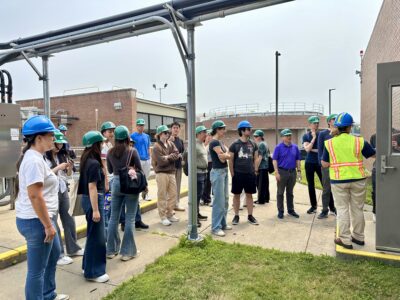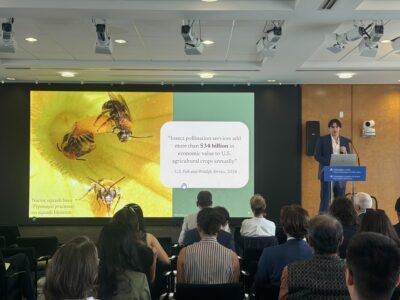
1. What is your current job?
I’m an associate at Synapse Energy Economics, a research and consulting firm. My primary areas of focus include long-term energy planning and compliance with energy and environmental policy.
2. Do your current job responsibilities align with the professional goals that you originally had when you began the Master of Public Administration in Environmental Science and Policy program (MPA-ESP)?
Immediately before coming to the program, I was working with the Democratic Party and at an environmental law and advocacy group in the Midwest. Prior to that I was working for the Deputy Mayor of Tel Aviv. I also had experience as an engineering consultant. When I started at Columbia I was becoming increasingly interested in the roles that economics and finance play in the world of environmental policy. This job couldn’t be a better fit for me.
3. What skills has the MPA-ESP program taught you that you think have proven useful to your current position?
The MPA-ESP program exposed me to topics from the entire spectrum of the environmental sphere. I didn’t become an expert in every one of the issues I studied, but I learned enough about them that I had the resources to find the answers I need.
4. What skills and tools do you hope to acquire through this job?
Working at Synapse has afforded me the opportunity to work with some really amazing modeling tools that help me analyze the utility sector in new and interesting ways.
5. How has collaborating with your fellow students in class projects benefited you professionally and personally?
At my jobs before SIPA, there was always a strict chain of command and disputes were often resolved in a top-down manner. Working in groups with your peers (as you do in Workshop and every other group assignment in the program) forces everyone to deal with conflict resolution in a much different and, I would argue, more productive manner. Synapse places a premium on working collaboratively, and my time at the ESP program prepared me to function more effectively in the increasingly common “flat” organizational style.
6. What kinds of environmental initiatives do you hope to start in your new position?
Compliance with EPA’s proposed 111(d) rule—which would cut CO2 emissions from the utility sector—is a hot-button issue right now. At Synapse, we work with state agencies, consumer advocates, and environmental groups, so not only do we get to assist states in complying with the regulation, but we also get to help figure out the lowest cost path to compliance.
7. How do you intend to utilize your degree from the MPA-ESP program to further your career?
A lot of my clients are public administrators dealing with the exact problems that I studied and dealt with at Columbia; I think that my experiences give me some insight into the issues my clients are struggling with, and allows me to help them resolve issues in the most optimal way possible.
Students in the MPA in Environmental Science and Policy program enroll in a year-long, 54-credit program offered at Columbia University’s School of International and Public Affairs, in partnership with the Earth Institute.
Since it began in 2002, the MPA in Environmental Science and Policy program has given students the hands-on experience, and the analytical and decision-making tools to implement effective environmental and sustainable management policies. The program’s 682 graduates have advanced to jobs in domestic and international environmental policy, working in government, private and non-profit sectors. Their work involves issues of sustainability, resource use and global change, in fields focused on air, water, climate, energy efficiency, food, agriculture, transportation and waste management. They work as consultants, advisers, project managers, program directors, policy analysts, teachers, researchers, and environmental scientists and engineers.
Visit our website for more information: http://mpaenvironment.ei.columbia.edu/



